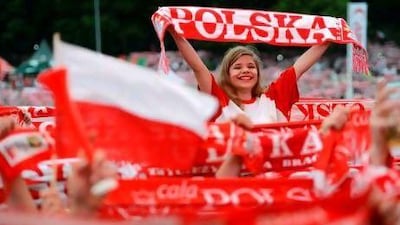First, the good-natured smile at your efforts to pronounce a Polish greeting. Next, the polite query as to where you come from. Then the key question: "How do you find Poland? Will you come and visit us again?"
There has been a sense of anxiety to this European Championship, an underlying concern that Poland might not be succeeding in the co-hosting of it. Part of that can be attributed to the justifiable pride people here take in looking after their guests: failing them during this grand party would be a disgrace.
Part to a residual disbelief that an event of this magnitude - the No 2 tournament of the world's most popular sport - is taking place in a nation that has spent long, painful decades struggling for independence and self-control. Devastated by Germany and the Soviet Union during the Second World War and forsaken by the Allies after it, Poles are still redeveloping their country and recovering confidence.
Euro 2012 will contribute. Much of Poland's half of this tournament has gone extremely well. The games have been entertaining, balanced and unpredictable. Its two groups delivered dramatic finales in which Russia completed their tumble from Group A leadership to casualties after a Czech Republic goal against Poland, and Spain flirted with a similar fate against Croatia.
Four purpose-built stadiums in Gdansk, Poznan, Warsaw and Wroclaw have impressed not simply in design, but in the organisation within them. The complex logistics of running a big event have been handled without major complaint. There were more teething problems in Switzerland, home to Uefa's headquarters, in 2008.
Aside from the Spanish complaints about a Gdansk pitch that was not trimmed and watered to the holders' preferred levels, the eight nations who have played and the five others training here have been happy. Poland could do nothing to alter competition regulations that require both teams to agree on the extra sprinkler sessions Spain wanted.
Less impressive have been the infrastructure projects planned for completion before the tournament. Around the country, public works stand part-finished. Warsaw's second metro line brought no spectators to the National Stadium, but the scar it cuts through the city centre inconvenienced hundred of thousands of residents and visitors.
Supporters taking the ponderous intercity train from Warsaw to Gdansk (well over five hours to cover 345 kilometres), had plenty of time to observe the incomplete motorway between the capital and the Baltic Coast. When inspections determined that the new road was not being constructed to EU standards, its Chinese contractors decided to cut their losses and pull out of the project.
Arriving in Gdansk, there are more unfinished roads, and a slightly complicated system of tramlines shut down on match days when a special train takes over transportation duties to a stadium set in industrial land. On the far side of Arena Gdansk, hidden from the media entry routes, a quarter-built flyover dramatically switches from newly laid tarmac to dirt foundations. Another deadline missed.
"A lot of things have been built, but maybe built too quickly," says one Tri-city resident. "We'll see in the next few years if they have been done with quality or not. For now, everyone is quiet, the focus is on making the Euros a success, but soon the politicians will start fighting over how much money was spent and where it all went."
The squabbling over the national team's failure to escape a relatively weak group has already begun. On the eve of Poland's passionate opening game, Franciszek Smuda teased domestic media for three years in which "there was too much criticism".
Inside an hour of elimination without a win, Smuda, 63, had resigned as his impressively whole-hearted captain was busy exposing the problems Poland's players had suffered obtaining tickets from their Football Association for their families to attend matches.
"The president says he has a great relationship with the team but I haven't witnessed anything like that," said Jakub Blaszczykowski, the Poland captain. "Each time we had an agreement on something with Mr [Grzegorz] Lato, he never kept his word."
A determined campaign to eliminate racism from the tournament unearthed verbal abuse at a Holland training session, has resulted in the Croatian federation being fined €80,000 (Dh373,000) for the misbehaviour of a section of its support, and similar charges against Germany.
The Russian Football Union was fined €120,000 and given a six-point suspended penalty for the improper conduct of supporters. Too many incidents have been reported, yet fewer than many predicted.
How have the majority of visitors answered those expectant Polish questions about their country? Positively. They will be back.
Has the tournament met all of Poland's expectations of it? No. They would like their team to have done better and their bank accounts to be fuller with foreign revenue, but this summer of Euro crisis was never going to allow that.
"We raised our prices by 100 zloty (Dh110), many hotels increased them by hundreds of euros," says Dorota Licznerska, owner of Willa Ludwinia, a Gdynia hotel. "They scared people off. Gdynia will be busier for next month's Open'er music festival than it is now."
Yet music festivals happen every year, most smaller nations experience the European Championship only once.
Poland's has been better than most expected. And it will not be forgotten.
Follow us
& Duncan Castles

